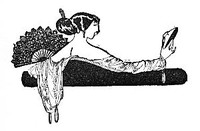The Hohenzollerns in America<br />With the Bolsheviks in Berlin and Other Impossibilities, Stephen Leacock [crime books to read txt] 📗

- Author: Stephen Leacock
Book online «The Hohenzollerns in America<br />With the Bolsheviks in Berlin and Other Impossibilities, Stephen Leacock [crime books to read txt] 📗». Author Stephen Leacock
"After a storm-tossed voyage of three months..."
Wait a bit. Turn on the picture again and toss the caravels up and down.
"...during which the food supply threatened to fail..."
Put that on the screen, please. Columbus surrounded by ten sailors, dividing up a potato.
"...the caravels arrived in safety at the beautiful island of San Salvador. Columbus, bearing the banner of Spain, stepped first ashore. Surrounded by a wondering crowd of savages he prostrated himself upon the beach and kissed the soil of the New World that he had discovered."
All this is so easy that it's too easy. It runs into pictures of itself. Anybody, accustomed to the movies, can see Columbus with his banner and the movie savages hopping up and down around him. Movie savages are gay, gladsome creatures anyway, and hopping up and down is their chief mode of expressing themselves. Add to them a sandy beach, with palm trees waving visibly in the wind (it is always windy in the movies) and the thing is done.
Just one further picture is needed to complete the film.
"Columbus who returned to Europe to lay at the feet of the Spanish sovereigns the world he had discovered, fell presently under the disfavour of the court, and died in poverty and obscurity, a victim of the ingratitude of princes."
Last picture. Columbus dying under the poignant circumstances known only in the movies—a garret room—ceiling lower than ever—a truckle bed, narrow enough to kill him if all else failed—Teresa Colombo his aged mother alone at his bedside—she offers him medicine in a long spoon—(this shows, if nothing else would, that the man is ill)—he shakes his head—puts out his hand and rests it on the little globe—reaches feebly for his compasses—can't manage it—rolls up his eyes and fades.
The music plays softly and the inexorable film, like the reel of life itself, spins on, announcing
At this theatre All next week MAGGIE MAY and WALTER CURRAN in IS IT WORTH ITAnd after that I can imagine the audience dispersing, and the now educated children going off to their homes and one saying as he enters—
"Gee, I seen a great picture show at school to-day."
"Yes?" says his mother, "and what was it?"
"Oh, it was all about a gink that went round the cabarets trying to sell an invention what he'd got but nobody wouldn't look at it till at last one dame gave him three oyster boats, see? and so he and a lot of other guys loaded them up and hiked off across the ocean."
"And where did he go to?"
"Africa. And he and the other guys had a great stand in with the natives and he'd have sold his invention all right but one old dame got him alone in a hut and poisoned him and took it off him."
That, I think, is about the way the film would run. When it is finished I must get President Shurman, or whoever it was, to come and see it.
4.—Politics from Within
To avoid all error as to the point of view, let me say in commencing that I am a Liberal Conservative, or, if you will, a Conservative Liberal with a strong dash of sympathy with the Socialist idea, a friend of Labour, and a believer in Progressive Radicalism. I do not desire office but would take a seat in the Canadian Senate at five minutes notice.
I believe there are ever so many people of exactly this way of thinking.
Let me say further than in writing of "politics" I am only dealing with the lights and shadows that flicker over the surface, and am not trying to discuss, still less to decry, the deep and vital issues that lie below.
Yet I will say that vital though the issues may be below the surface, there is more clap-trap, insincerity and humbug on the surface of politics than over any equal area on the face of any institution.
The candidate, as such, is a humbug. The voters, as voters—not as fathers, brothers or sons—are humbugs. The committees are humbugs. And the speeches to the extent of about ninety per cent are pure buncombe. But, oddly enough, out of the silly babel of talk that accompanies popular government, we get, after all, pretty good government—infinitely better than the government of an autocratic king. Between democracy and despotic kingship lies all the difference between genial humbug and black sin.
For the candidate for popular office I have nothing but sympathy and sorrow. It has been my fortune to walk round at the heels of half a dozen of them in different little Canadian towns, watching the candidate try in vain to brighten up his face at the glad sight of a party voter.
One, in particular, I remember. Nature had meant him to be a sour man, a hard man, a man with but little joy in the company of his fellows. Fate had made him a candidate for the House of Commons. So he was doing his best to belie his nature.
"Hullo, William!" he would call out as a man passed driving a horse and buggy, "got the little sorrel out for a spin, eh?"
Then he would turn to me and say in a low rasping voice—
"There goes about the biggest skunk in this whole constituency."
A few minutes later he would wave his hand over a little hedge in friendly salutation to a man working in a garden.
"Hullo, Jasper! That's a fine lot of corn you've got there."
Jasper replied in a growl. And when we were well past the house the candidate would say between his teeth—
"That's about the meanest whelp in the riding."
Our conversation all down the street was of that pattern.
"Good morning, Edward! Giving the potatoes a dose of Paris green, eh?"
And in an undertone—
"I wish to Heaven he'd take a dose of it himself."
And so on from house to house.
I counted up, from one end of the street to the other, that there were living in it seven skunks, fourteen low whelps, eight mean hounds and two dirty skinflints. And all of these merely among the Conservative voters. It made me wish to be a Liberal. Especially as the Liberal voters, by the law of the perversity of human affairs, always seemed to be the finer lot. As they were NOT voting for our candidate, they were able to meet him in a fair and friendly way, whereas William and Jasper and Edward and our "bunch" were always surly and hardly deigned to give more than a growl in answer to the candidate's greeting, without even looking up at him.





Comments (0)